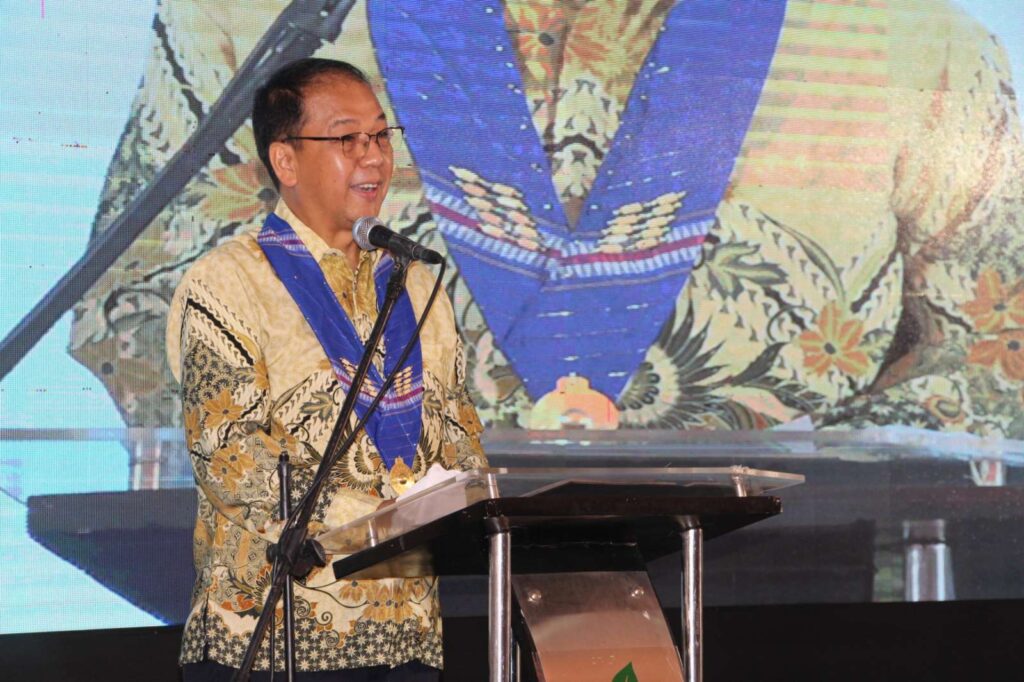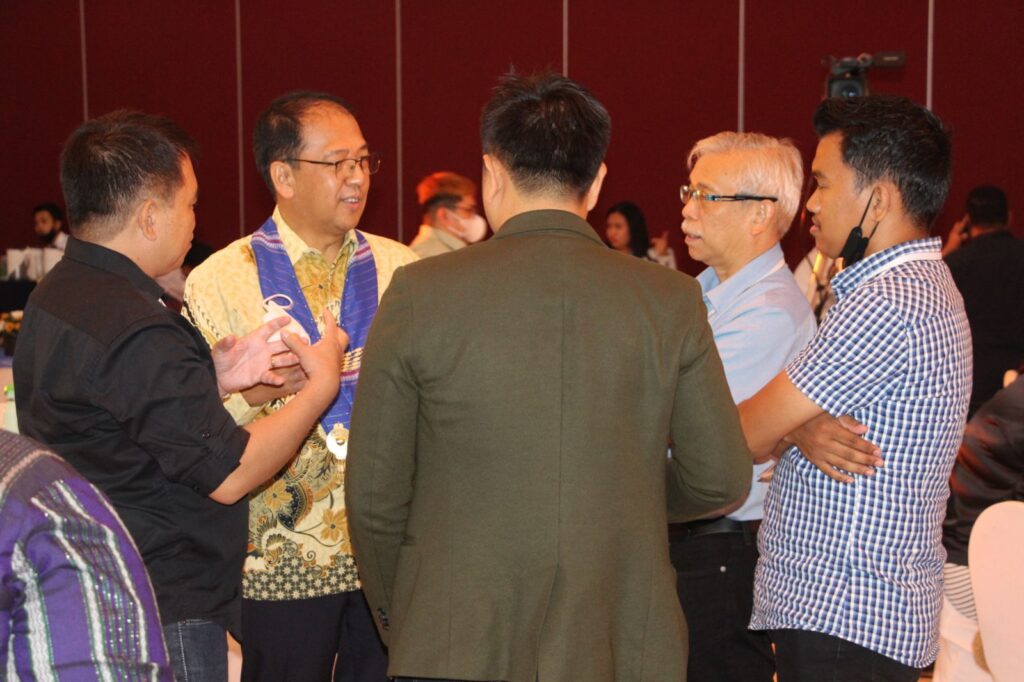DAVAO CITY — Over a hundred peace education champions from all over the country converged here in this city to provide recommendations on how to more effectively mainstream peace education in the basic and higher education sectors.
The two-day First National Peace Education Summit, organized by the Office of the Presidential Adviser on Peace, Reconciliation and Unity (OPAPRU) in coordination with the Department of Education (DepEd) and Commission on Higher Education (CHED), and with support from Ateneo de Davao University and Mindanao State University, aims to facilitate more robust peace constituency-building interventions through partnerships and network-building and gather recommendations to strengthen the implementation of peace education in the country. The momentous occasion falls on the same day that the executive fiat was signed 16 years ago.

Beyond the classroom
Presidential Peace Adviser Secretary Carlito G. Galvez, Jr. noted that peace education is not only about learning the culture of peace, “but more [about] having the right information, skills, and mindset that will enable one to defuse, if not, prevent situations of violence and conflict.”
“Peace education approaches should aim to go beyond curriculum development and must be geared towards building particular competencies, values, and practices that can be effectively applied outside the classroom,” Galvez said in his keynote message on Monday.
The peace adviser underscored that academic institutions play an instrumental role in promoting the culture of peace, as they can help in “weeding out violence, hazing, and bullying, especially in the formative years of young learners.”
Galvez said promoting peace education in the formal educational setting will require peace stakeholders to develop a creative, inclusive, innovative, holistic, and comprehensive strategy wherein no one should be left behind and everyone is part of the peacebuilding process.
“Let us give deeper meaning to peace education and its desired outcome of molding children to embody interfaith and cultural understanding, tolerance, harmony and service throughout their lifetime. Peace education is vital in providing spaces to generate important lessons on negotiations, mediation, conflict resolution, fraternity, common good, justice and unity,” Galvez said.
“Most importantly, peace education is a potent strategy in honing the minds, hearts and spirits of future peacemakers on the art of imbibing non-violent approaches towards the ultimate goal of mainstreaming the culture of peace in the country,” he added.

Institutionalizing Peace Education
Issued in 2006, Executive Order No. 570, entitled “Institutionalizing Peace Education in Basic Education and Teacher Education” started the implementation of peace education activities in academic institutions throughout the country.
Since the issuance of EO 570, the OPAPRU began efforts to mainstream peace education in the country’s education curriculum. However, these initiatives were not sustained, as the agency’s initiatives were focused on the implementation of peace agreements.
The signing of EO 158 in 2021 entitled “Strengthening the Policy Framework on Peace, Reconciliation and Unity and Reorganizing the Government’s Administrative Structure for the Purpose,” put peace education at the core of OPAPRU’s peacebuilding strategies.
With its expanded mandate, the OPAPRU organized a Community of Practice (CoP) for peace education practitioners in November 2021 which became a platform for them to share knowledge and exchange experiences.
In June 2022, the OPAPRU spearheaded a Peace Education Community of Practice Planning Session in Davao City. It was participated in by representatives from 17 Higher Education Institutions (HEIs) from all over the country.
The OPAPRU has also held peace education conversations through various Learning and Reflection Sessions (LRS) with different academic institutions. The latest LRS was conducted last July 29 together with the Centre for Humanitarian Dialogue and attended by almost 200 virtual participants.
Strong support from DepEd, CHED
At the same Peace Education Summit, Department of Education Assistant Secretary Dexter Galban delivered the message of Vice President and Education Secretary Sara Duterte-Carpio, which highlighted the need to revitalize the mainstreaming of peace education efforts.
“As the secretary of the Department of Education, I look forward to collaborating with the community of peace education practitioners who have developed peace education teaching exemplars and are implementing peace education programs,” Duterte-Carpio said.
The vice president stressed the importance of the event, saying, “Let us help children and the youth heal from the trauma brought by armed conflict to their lives and protect them from being recruited into joining violent extremist groups.”
“I believe peace education is a core strategy for peacebuilding and post reconstruction efforts. May this event strengthen community-based peacebuilding initiatives and bolster efforts to build a national education peace curriculum,” she said.
In a statement, the Commission on Higher Education (CHED) Chairman Popoy De Vera expressed his full support for the National Peace Education Summit.
“The Commission fully supports the First National Peace Education Summit organized by the Office of the Presidential Adviser on Peace, Reconciliation and Unity. Peace is a continuously evolving concept and there is a need to make peace a lifestyle. The promotion of peace education is not just to rectify historical injustice, but it must have a sense of urgency,” De Vera said.
“Higher education institutions must be seriously involved in peace education. Discussions on peace must seriously rectify distortion in historical interpretation. It is the responsibility of HEIs to undertake research to rectify historical distortion, to imbed peace education in their teaching function, and bring these discussions to communities around their campuses,” he added.
In a separate press conference held at the sidelines of the education summit, Galban reported that the Department of Education has been rolling various peace education activities even before the issuance of EO 570.
“In terms of impact, it’s a continuing process. All of the gaps that are being seen are continuously being addressed every time that we refresh or strengthen the curriculum,” he said, adding the agency is now reviewing its K-12 Program through its curriculum and instruction strand.
Aside from the regular peace education activities, the DepEd is carrying out in partnership with OPAPRU, he said the education department will also be conducting co-curricular and extra-curricular interventions with the peace agency” to champion the peace process.”
Galban likewise emphasized the need to scale up peace education efforts as extremist and violent groups are using avenues outside the curriculum “as mechanisms to recruit our young learners away from upstanding citizenship.”
“That’s why we are very thankful Sec. Galvez has been a major supporter of this, possibly integrating such in what we are exploring with the DND (Department of National Defense) as part of the preparatory citizenship training,” he said.
“We need to show them that the programs are holistic and comprehensive for them. So that they will feel that such arguments [of the extremist groups] cannot stand,” Galban added.
Galvez agreed with Galban, saying that “Education is very important. Because education will give you the foundation so that you will not be swayed by these extremist groups. You will now have the social awareness of what is the right thing to do.”
“Peace education will be the foundation in achieving peace. Because it provides a venue, understanding and mindset that peace cannot be achieved by force,” he added.
The summit served as a platform for participants to share best practices on peace education, anchored on a specific context from where the participants are situated, and the organization and experiences they represent and bring.
It also opened opportunities for assistance and support in promoting and advocating peace education through linkage and networking among the participants.
Proposed strengthened EO
During the summit’s plenary session, the OPAPRU presented a proposed strengthened version of Executive Order 570 entitled “Strengthening the Institutionalization of Peace Education Studies in Basic and Higher Education.”
The delegates, both attending physically and online, were divided into groups and were asked to identify gaps in the mainstreaming of peace education in the basic and higher education sectors, as well as provide recommendations on how to address these challenges.
During the deliberations, the participants were provided a set of guide questions – which could be best addressed by the academe — were integral in further improving the proposed EO strengthening EO 570 and are best addressed by the academe.
The responses of the participants, which were fully documented, were presented before the plenary. During the deliberations, the clamor to strengthen EO 570 became more apparent, and speaking unanimously, the academe pressed for the institutionalization of Peace Education in the basic and higher education curricula, as well as the establishment of Peace Centers in schools and campuses across the country.
Likewise, alternative sources of funding for the implementation of the proposed EO were discussed. Further, in affirming the success and progress made during the Summit, the participants called for the annual conduct of the National Peace Education Summit.
The inputs gathered from the deliberations will be consolidated, fine-tuned and incorporated into the proposed strengthened EO.
Human Fraternity Document
In his closing message during the summit, Fr Joel Tabora, president of the Ateneo de Davao University, highlighted the key lessons of the Human Fraternity Document signed by Grand Imam of Al Azhar, Ahmad Al Tayeb in Abu Dhabi in February 2019.
Quoting the Human Fraternity Document, Tabora said: “…the adoption of a culture of dialogue as the path, mutual cooperation as the code of conduct, reciprocal understanding, as the method and standard.”
“It was a document about human fraternity, world peace and living together. It was a document about shared conviction, and shared purpose of God. Ultimately, it was a document about peace,” he explained.
“If today in this First National Congress on Peace Education, we are serious about a commitment to peace education, especially in a Mindanao context where most are Muslim or Christian, it is a document that has much to say to us,” Tabora said.
He said that it is “legitimate for the DepEd and CHED, in collaboration with the OPAPRU, to promote peace education in all basic and higher institutions in the country on the basis of Art. XIV, Sec. 3, of the 1987 Constitution provided that the academic freedom granted by the same Constitution in all higher education units in Art. XIV, Sec.5 is respected.”
“This means that HEIs, public and private, freely adopt that and shape their peace education programs as they see warranted. HEIs and schools may even wish to incorporate peace education or its equivalent in their mission statements,” Tabora said.
###






